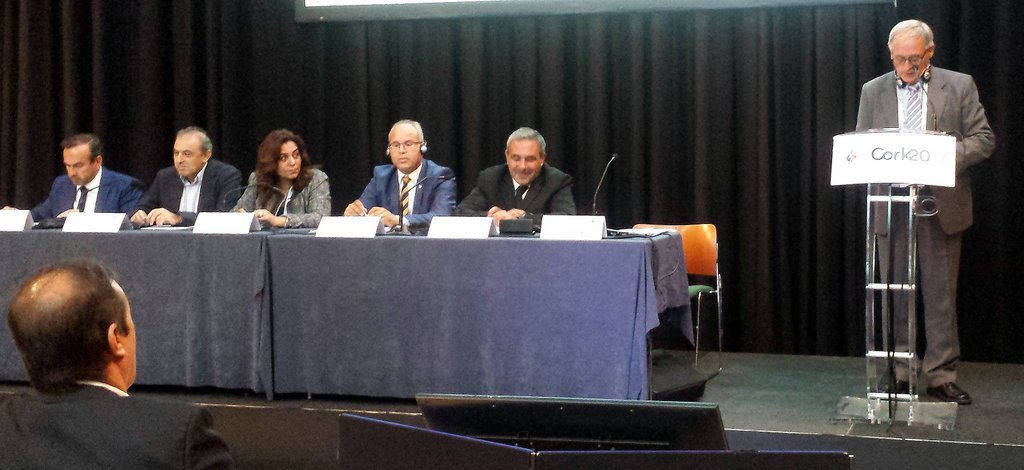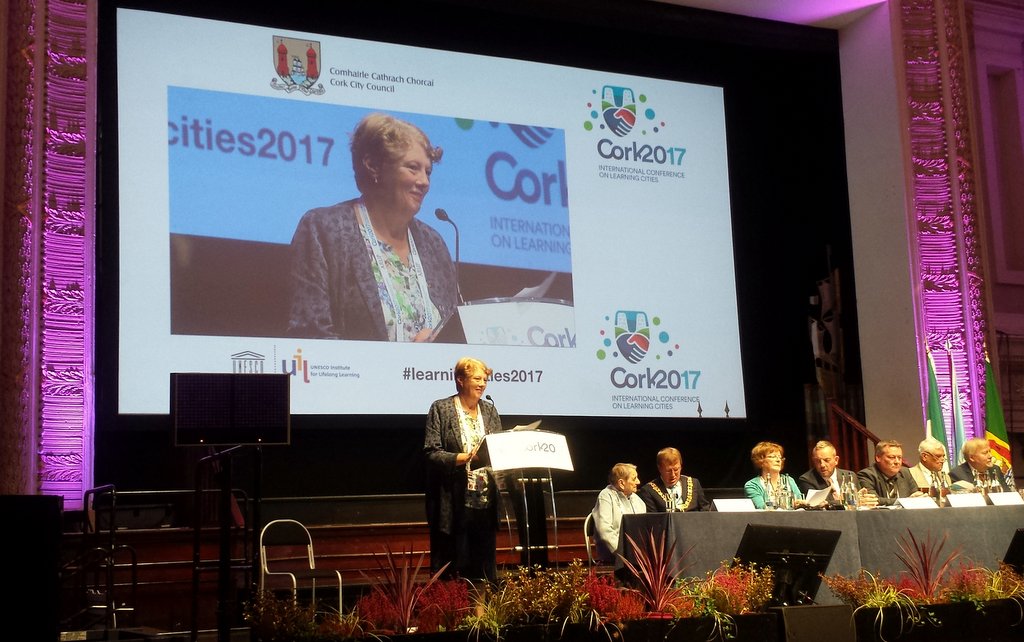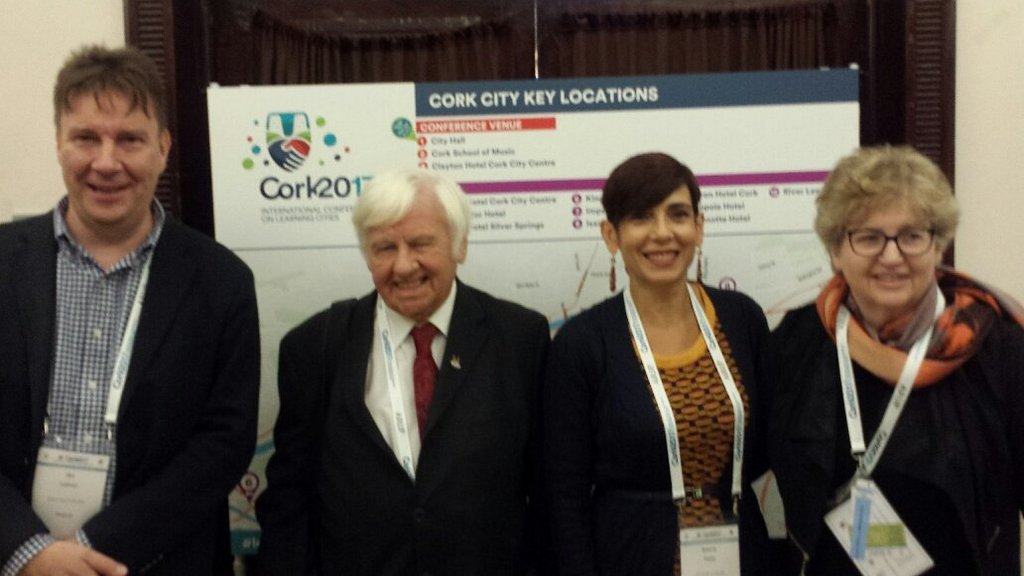PASCAL delegation at the Third Global Learning Cities Network conference in Cork, 17-19 Sept, 2017
The PASCAL Observatory was delighted to have been invited by the UNESCO Institute for Lifelong Learning, with whom it has a Memorandum of Understanding related to lifelong learning, to send a delegation to the Third Global Learning Cities Network conference in Cork from 17-19 September 2017.
![[Standing] Yuan Dayong, Willie McAuliffe (Cork City), Maggie McAuliffe, Norman Longworth, Roberta Piazza, Lesley Doyle, Leone Wheeler [Seated] Chris Shepherd, Denise Reghenzani-Kearns [Standing] Yuan Dayong, Willie McAuliffe (Cork City), Maggie McAuliffe, Norman Longworth, Roberta Piazza, Lesley Doyle, Leone Wheeler [Seated] Chris Shepherd, Denise Reghenzani-Kearns](/sites/default/files/images/pascal_cork-01.jpg) [Standing] Yuan Dayong, Willie McAuliffe (Cork City), Maggie McAuliffe, Norman Longworth, Roberta Piazza, Lesley Doyle, Leone Wheeler; [Seated] Chris Shepherd, Denise Reghenzani-Kearns
[Standing] Yuan Dayong, Willie McAuliffe (Cork City), Maggie McAuliffe, Norman Longworth, Roberta Piazza, Lesley Doyle, Leone Wheeler; [Seated] Chris Shepherd, Denise Reghenzani-Kearns
At this UNESCO International Conference on Learning Cities, magnificently hosted by the City of Cork in Ireland and attended by over 750 delegates from 93 countries, we are seeing the Learning Cities network continue to expand its influence worldwide. Sixteen cities across all UNESCO regions, with very disparate cultures, have been selected for the UNESCO Learning City Award 2017 including Limerick (Ireland), Bristol (UK), Mayo-Baléo (Cameroon), Giza (Egypt) and Villa Maria (Argentina) and Pecs (Hungary). Balázs Németh, Associate Director of PASCAL in Europe and Professor of Lifelong Learning at the Faculty of Adult Education and HRD of the University of Pécs played a significant role in Pécs’s achievement. And the University of Pécs of course was the host of a previous PASCAL conference in 2007. Each city has put together a Learning City plan that adapts to its own cultural heritage.
Amongst PASCAL’s other contributions at the conference were the following:
Chris Shepherd, Deputy Chair of PASCAL led a session involving Mayors, deputy Mayors, heads of Technical Services on Planning and Urban development, and administrators from Europe and Africa. They each discussed how to face problems of social exclusion. Many different experiences were presented, all recognising that lifelong learning and learning cities are viable ways to tackle disadvantage and to foster social inclusion.

Chris Shepherd at the podium
Questions to the five-person panel from the floor of the session included: How has being part of the Learning Cities global network made a difference to your job as administrators? The Deputy Mayor of Larissa, Greece, responded with: ‘Being part of a network can help to face our challenges (economic crisis, refugees) and to find solutions looking at what the other cities have already done. Being a part of a Learning Cities network inspires us to do better’.
In a session on the Cork Global Action Plan, Peter Kearns, who has led PASCAL’s work in learning cities for a number of years, elaborated on the contribution of the PASCAL project EcCoWell (Ecology, Community, Lifelong Learning and Well-being - an holistic and integrated approach to building a sustainable learning city), started in 2013. This has been an inspiration of the work of the city of Cork.
 Judith James (Cork City) at the podium
Judith James (Cork City) at the podium
Leone Wheeler, PASCAL Board member, in a session on equity and equality talked about the experience of developing Learning Communities over a period of 16 years in both rural and city areas of New South Wales and Victoria (Australia). She drew on an evaluation as reported in the reports on Learning as a Driver for Change.
 Ilpo Laitinen, Norman Longworth, Roberta Piazza, Leone Wheeler
Ilpo Laitinen, Norman Longworth, Roberta Piazza, Leone Wheeler
Rob Mark, leader of PASCAL’s Learning City Network called a well-attended Inter-faiths and Learning meeting setting out some future possibilities for dialogue and projects for example in in New York and Glasgow.
Keynote speakers, panellists and speakers from the floor all provided examples of how engagement as a Learning City ensures close attention to sustainability, inclusion, and equity and also, no matter what the stage of development of their countries, are emphasising the importance of the UN’s Sustainable Development Goals (SDGs) in providing direction and targets. Sonderberg (Denmark) has fitted the key features of the Learning City goals with the SDGs matrixed into an assessment on the wider benefits as a Learning City. Countries in the Mediterranean area have been focussing their efforts on what it means to create a Learning City in a time of crisis and address the challenges posed to their countries by new immigration. The Learning City model is seen as a great support in the integration of immigrants and the creation of a more sustainable development process for cities and countries. Speakers from the Nordic countries (Denmark, Finland, Sweden) are actively at the conference keen to promote the call to action for Learning Cities to support open, transparent and participatory processes in the development of inclusive knowledge societies.
 Arne Carlsen (former Director of UIL), Balazs Nemeth
Arne Carlsen (former Director of UIL), Balazs Nemeth
There is evidence that the Learning Cities concept is making a real change right across the world. By way of example, it is facilitating dialogue on practical ways of dealing with social exclusion and creating new opportunities for employment in places as diverse as Limerick (Ireland), Ufa (Russian Federation), Contagem (Brazil) and Al Wakra (Qatar).
Engagement by Mayors has established a mayoral buy-in to the concepts and actions of being a Learning City and sustaining that.
PASCAL Associate, Yuan Dayong, from Beijing says that:
The Cork international conference on learning cities will definitely be a milestone … it is good timing for the city to make the idea into reality, from international understanding to local practice … it is a big party for all learning cities researchers, administrators, practitioners to share and to contribute for the future of learning cities.
The challenge, delivered at the beginning of the conference was that each one of the attendees take away one new action, share the idea and generate enthusiasm and collaboration for its implementation.
Dr Lesley Doyle
PASCAL Associate
 Printer-friendly version
Printer-friendly version- Login to post comments








Comments
Fabulous Contribution
Well done to all our colleagues in PASCAL who have made such as good contribution to this highly successful event organised by our friends and partners in Cork and at UIL.
Promoting Green and Healthy Cities
The Thematic Forum I on Promoting Green and Healthy Cities, at the 3rd UNESCO International Coference on Learning Cities in Cork, dealt with the matters of how green, environmental and bio-diversity issues can be better pursued through the collaborative actions of local communities and councils in and around cities.
Examples from Germany (Ms. Martina Eick from Umweltbudesamt) and also, from South Africa through ICLEI (Ms. Kirsty Robinson from Local Governments for Sustainability) highlighted the neccesity of local and regional collaborations for bio-diversity and sustainable environments in specific forms of knowledge transfer and skills development.
The dimension of health was brought into the panel activity by Dr. José G. Siri on behalf of International Institute for Global Helath of United Nations University to elaborate upon a systems approach to SDGs and its relationship towards learning in urban structures.
"Cork Guide to Action" statement
We are particularly delighted that Cork were one of the first participants in the PASCAL PIE/LCN programs, and took up the PASCAL Learning Neighbourhood projects, both conceived by PASCAL Board member, Peter Kearns. At the Cork confernence Peter was also elected to serve on the Drafting Committee of the Conference to deliver the "Cork Guide to Action" statement as the outcome from this UNESCO Conference. Peter is missing from photos, because of the many add-on meetings behind closed doors that he was called to for the drafting on the statement.
We were also pleased to attend anadditional day was devoted to four educational field trips including institutions and learning neighbourhood interactive exhibitions. A special afternoon 'sampler' of a typical day in Cork's annual Lifelong Learning Festival was also on offer.
Where after Cork? Welcome to Colin McGregor from New Zealand
Pictured right: Colin McGregor,(ACE Aetearoa, New Zealand) with Mike Osborne (PASCAL, University of Glasgow)